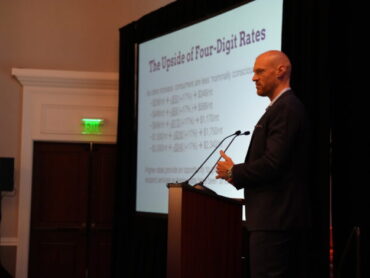Dear Prudence
Allow the following story to serve as a lesson in prudence, and please consider its legal issues as they pertain to personal privacy.
I recently sat down with an old friend employed as the GM of a boutique hotel in the American South. He was in town on business, so we met at a café not far from my office. Immediately after we exchanged pleasantries and ordered coffee, his head collapsed into his hands and sweat beaded around his temple. A deflated groan followed.
“Everything alright?” I asked.
“We’ve just had an outrageously horrible experience with a guest,” he said, “And I’m afraid he may file a lawsuit.” As he proceeded to divulge the facts of his case, my eyes grew wide as saucers and my jaw slowly dropped to the table.
It began on a typical evening of a typical day, at the front desk of all places. The phone rang. “Could you transfer me to John Doe, please?” asked this caller. “He’s a guest at your hotel.” The man sounded courteous enough and the front desk had no reason to suggest that this caller was anything but a friend or colleague to the guest in question. The call was promptly transferred.
As it turned out, the caller was not a friend, but a reprehensible criminal. As soon as he reached John Doe’s room, the caller fraudulently misrepresented himself as a front desk employee! “Hello, John,” said the caller, “I’m at the front desk, and unfortunately the computer system has crashed. Your information has been wiped. If you could please provide us with your credit card number, your social insurance number and your date of birth so we can correct this error?”
John Doe complied without question. After a call from his bank the next morning, he quickly discovered that thousands of dollars were missing from his account. Needless to say, he was flush with anger, and the hotel was about to receive the brunt of it.
He accused the staff of being party to the crime. Even if they weren’t complicit, they were still to blame for transferring the call to his room. The hotel staff expressed their sincere apologies and offered help liaise matters with the bank. The GM also heard the story and, as an immediate palliative action, John Doe wasn’t charged for the night’s stay.
This was not enough to appease John Doe, however. He stormed out, and soon found a new drain for his frustration – the internet – where he wrote a lengthy diatribe against the hotel, filled with hateful rhetoric that often strayed far from his immediate problems involving credit card fraud.
So, is John Doe right to blame the hotel for his misfortunes? Or is it his responsibility to act with reasonable foresight before relinquishing personal information? Most importantly, is there an all-encompassing remedy for situations like this?
Let’s analyze this from a legal point of view. According to the facts, John Doe never expressed his desire to keep his stay confidential. He never expressed his wish to the hotel that he did not want calls to be transferred to his room. There is no proof that he held a subjective expectation of privacy barring calls from reaching his room. It is unfair for him to push the burden of guilt onto the hotel.
Technically, the property is not at fault. But legalities and logic will barely play into the equation once civility is thrown aside and emotions reign supreme. Hiding between red tape won’t save you from defamatory online reviews.
To avoid situations like this, I humbly put forth a suggestion. Upon check-in, the concierge should dutifully inquire as to whether or not a guest would want his stay to remain confidential. If guests affirm their privacy, then it gives the front desk a reason to deny transferring calls without appearing as rude or disrespectful to either party.
In the hospitality industry, prudence will always be a formidable virtue, and a simple question like this could easily prevent many future headaches.


